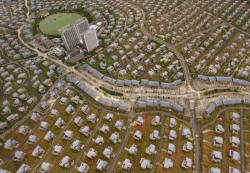|
Slowing China home price
rises add to doubts about economy
 Send a link to a friend
Send a link to a friend
 [July 18, 2016]
BEIJING (Reuters) - Home price rises
in China slowed in June for a second straight month, adding to fears
that a construction-led rebound in the economy may not be sustainable. [July 18, 2016]
BEIJING (Reuters) - Home price rises
in China slowed in June for a second straight month, adding to fears
that a construction-led rebound in the economy may not be sustainable.
The property market is a key driver of the world's second-largest
economy and a robust recovery in home prices and sales gave a
stronger-than-expected boost to activity in the first half of the
year.
But slowing price growth in smaller cities and cooling property
investment show the bounce may already be fading, raising the risk
of weaker economic growth in coming months.
Home prices in China's 70 major cities rose 7.3 percent in June from
a year earlier, an official survey showed on Monday, accelerating
from a 6.9 percent rise in May.
To be sure, some of the biggest cities showed eye-popping gains on a
yearly basis, with prices in the southern boomtown of Shenzhen up
46.7 percent and Shanghai up 27.7 percent.
Gains on a monthly basis continued to slow, however, as cities
tightened policies amid fears of a housing price bubble.

The monthly rise slowed slightly to 0.8 percent in June, easing from
0.9 percent in May, according to a Reuters calculation based on data
issued by the National Bureau of Statistics (NBS).
"We continue to expect the property rebound to subside and property
investment growth to fall in the second half of the year,"
economists at Nomura said in a note, predicting sales would
stabilize and a large glut of unsold homes would keep pressure on
prices in some areas.
"As such, our long-term view of a gradual (economic) slowdown
remains unchanged."
Prices stalled or fell on a monthly basis in 15 cities in June,
compared to 10 cities in May, with all of the weakness is smaller
cities.
Industrial cities Tangshan, Jinzhou and Baotou went from gains to
declines month-on-month in June.
First-tier cities maintained recent rapid price rises, with Shenzhen
and Shanghai rising 2.0 percent and 2.6, respectively, on a monthly
basis, faster than in May. That could raise the risk of further
property cooling measures in some areas.
CRACKS IN THE FOUNDATION
The recovery in China's property market and a government
infrastructure building spree in recent months have helped shore up
growth in economy, which has been weighed down by weak demand at
home and abroad, cooling investment and excess industrial capacity.
[to top of second column] |

Residential houses are seen in a valley in Tengchong, Yunnan
province, August 7, 2015. REUTERS/Stringer/File Photo

But there are increasing signs of fatigue in the nine-month-old property rally,
raising concerns about both the economic outlook and banks' heavy exposure to
mortgage lending.
Growth in investment in China's real estate sector slowed in first half to 6.1
percent, down from 7 percent in Jan-May, presenting a challenge for policymakers
who need the critical sector to maintain growth without creating a price bubble.
For June alone, property investment was up only 3.5 percent from a year ago,
according to Reuters calculations, compared with 6.6 percent in May.
Policymakers are facing a tough balancing act. The concern is that tighter
mortgage rules in the largest cities have not cooled prices enough, while
fragile markets in secondary cities that are beset by oversupply likely need
more stimulus to keep prices from sliding again.
After the investment data on Friday, economists at ANZ said that China's
property-led recovery was over, which could pose further risks to the economy in
the second half of the year.
(Reporting by Winni Zhou, Nicholas Heath and Elias Glenn; Editing by Kim Coghill)
[© 2016 Thomson Reuters. All rights
reserved.] Copyright 2016 Reuters. All rights reserved. This material may not be published,
broadcast, rewritten or redistributed.

 |